
Writing journeys
12 MIN READ

Writer and editor Rajendra Maharjan pens a powerful essay about his Writing Journey and the necessity of interrogating and changing oneself.

The experienced editor and writer Rajendra Maharjan grew up in a Nepal Bhasa-speaking family of skilled workers in Kirtipur, a Newa town perched on a low ridge overlooking the Kathmandu Valley. The men of his family were masons and carpenters, and the women had handicraft skills. They also farmed. His family’s language, ideas, and experiences shape his words and thoughts.
Through Rajendra-ji’s early experiences, we see the painful dislocations that modern Nepali schooling brought to many families during the Panchayat years. His schools celebrated some cultural traditions but pushed aside others, including the skills and language of his own upbringing. Several contributors to the Writing Journeys series — Sujeev Shakya, Chandrakishore, and Dhirendra Nalbo — have also commented on Nepal’s complicated linguistic landscape in their essays. Over the decades, Rajendra says, he had much to “unlearn.”
As elsewhere, Rajendra’s school did little to prepare him to write. Sadly, he says, Nepali schools teach “only how to copy down answers.” He rightly wonders how critical thinking skills can grow from such rote methods.
That said, though, Rajendra-ji’s journey offers many ideas and inspiration for aspiring writers. He points to several ingredients for building — not just stating, but actually constructing — an argument: research and analysis; understanding of history and global dynamics; collecting facts, quotations, and relevant evidence; and clear, compelling writing. “I’m not satisfied with just commentary,” he writes. It’s building a solid argument that counts.
Rajendra’s journey also shows the power of asking questions and relentless curiosity. His writing journey shows that pursuing a cause over many decades — in his case, fairness and opportunity for Nepal’s many diverse groups — will give you a lot to say.
Thank you, Rajendra ji, for sharing some of your journey!
Rajendra Maharjan is a writer, editor and publisher. He is currently the editor of the journal Madhesh Adhyayan. Maharjan writes socio-political commentary for Kantipur weekly and has published around three dozen books on Nepali society and politics.
Some of his writings include हथि मिसा : नेवार नायिकाको गोप्य प्रतिरोध (Hathi Misa: The secret rebellion of a Newar heroine), Kantipur, March 7, 2017; इतिहासले भन्यो, फेरि भेटौं है (History said, let’s meet again), Nepal magazine, April 14, 2020; and मिडिया को वर्ग चरित्र र वर्चस्व (The dominance and class character of the media), Media Adhyayan.
Writing Journeys appears every Wednesday on The Record. All of the older entries in the series can be found here.
***
How could the son of a Jyapu write?
ज्यापुको छोरोले कसरी लेख्यो होला ?
Some elders put you down with their questions. Certainly, there are only a few Newas who write political essays in Khas Nepali, with Jyapus even more exceptional. To those Jyapu who tried to do politics, they would ridicule with a contemptuous remark, “A manure carrier is worried about the palace!” (सा: कुबिया: लायकुया च्यूता:, मल बोक्नेलाई दरबारको चिन्ता !)
In my mother tongue, this is the meaning of Jyapu — farmer, laborer, those who can work. ‘Jyaa’ (ज्या) meaning labor, work, profession, employment, program, duty). ‘Jyaa’ was never associated with layaku (palace) and rajniti (politics). So as the son of a Jyapu, my writing and politics have always aimed to join the ‘jyaa’ with politics.
For this son of a Jyapu, leftist ideas and politics inspired me to till the field of words. In particular, Paulo Freire’s Pedagogy of the Oppressed shed a lot of light. His philosophical method helped me understand and change the world through the word. It was like fertilizer, nurturing my creativity and writing.
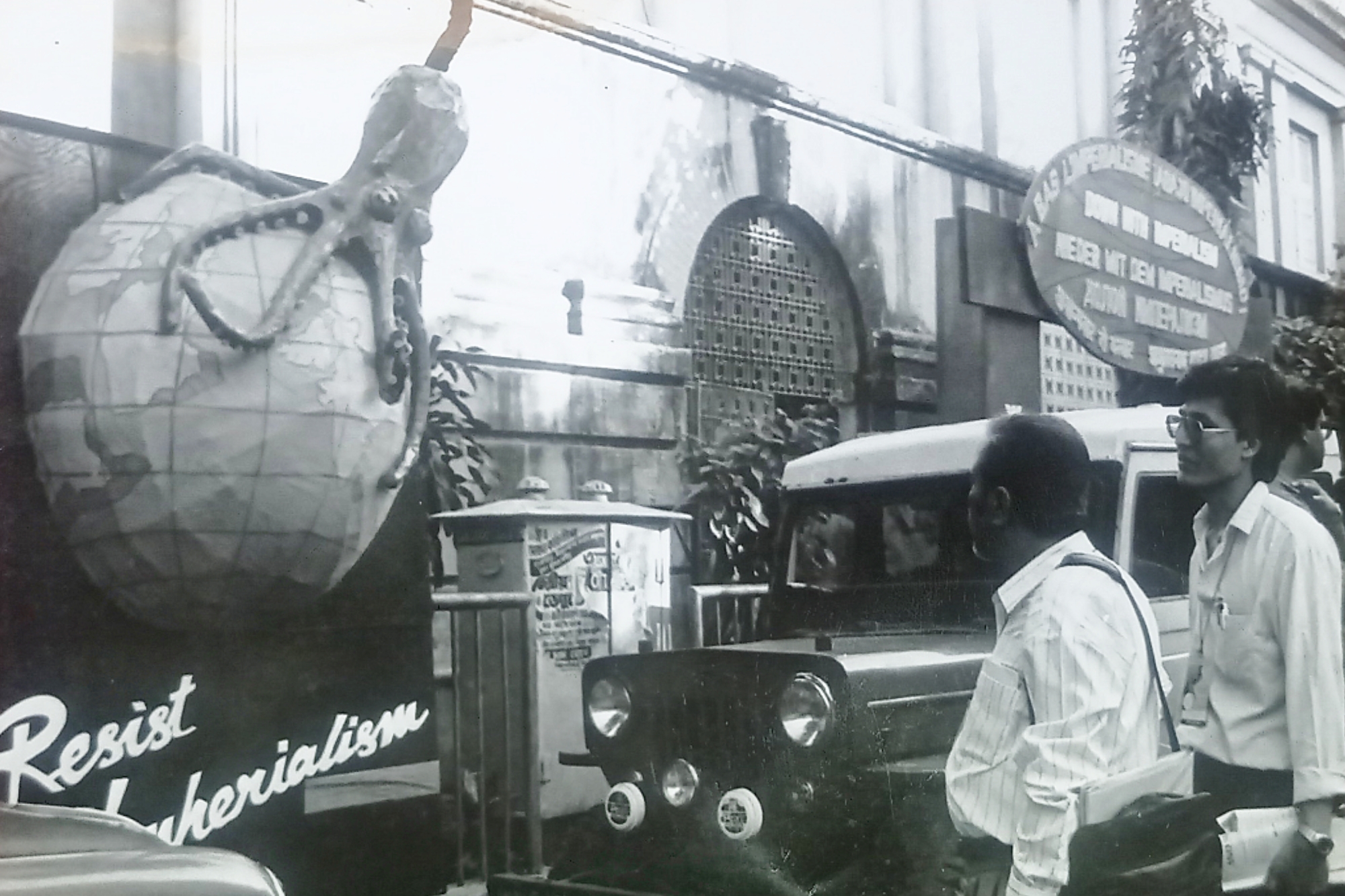
The call of consciousness
My grandfather was a mason, my father a carpenter, and my grandmother and mother were skilled with handicrafts. I was born in a family where one hand worked the fields while the other built the city’s palaces. Friendship with the leaders of Kirtipur got my mother and father interested in formal education for their children.
My grandmother used to say, “One who knows how to work is a slave but the one who knows things is a god.” I went to school at a time when education was about avoiding labor, which schools devalued. I went to be good at the Khas language. I grew up reading the 'Mahendra Mala', a school textbook that promoted nationalism and glorified the monarchy. This textbook was a part, actually a political weapon, of the ‘culture of silence' imposed by King Mahendra. I spent my childhood amid such an anti-intellectual environment.
For non-Khas-Nepali speakers, the school is an isolated island of state culture, distant from society. That regime pulls out the tongues of speakers of other languages and transplants the state’s own language, and deposits in the minds of students knowledge cut off from society, labor, and the working class.
I never took to formal education. In fact, it was a huge source of boredom for me. I was disenchanted and dissatisfied with the books that only taught “gyani (someone like a Pandit) from gya (ज्ञ)"'' and “Kshyatri (the warrior caste) from Kshya (क्ष)", that is, books that paid respect to particular castes while dominating others. But radio, newspapers, and other books fascinated me. They helped with my studies. The neighborhood library opened the world of books. I developed a taste for books outside of regular courses.
Because ours was a household of artisans, we didn’t have books. Even in the temple of education that was the school, there wasn’t room for books. In my experience, schools teach the curriculum, not about society, and they don’t teach to ask questions. For writing, they teach only how to copy down answers. How could creativity grow from this parrot-like rote learning?
For students like me, a consciousness of resistance and creativity related to labor came from outside of school. In childhood, I learned from radio, and in fourth or fifth class, I learned of Palestine and Yasser Arafat. I learned about China and the Soviet Union from China Illustrated and Soviet Land. I started learning about Nepali politics from Nepal Bhasa Nhipau (daily) edited by Padma Ratna Tuladhar and Inap edited by Malla K. Sundar.
I learned creativity from the Dabu Pyaakh (Purnika Natak, street theater) and from progressive cultural programs. I was impressed and heavily influenced by Kirtipur’s tangible and intangible performative culture. In 2044 BS, I became a founding member of the Indreni Cultural Society, a progressive cultural group.
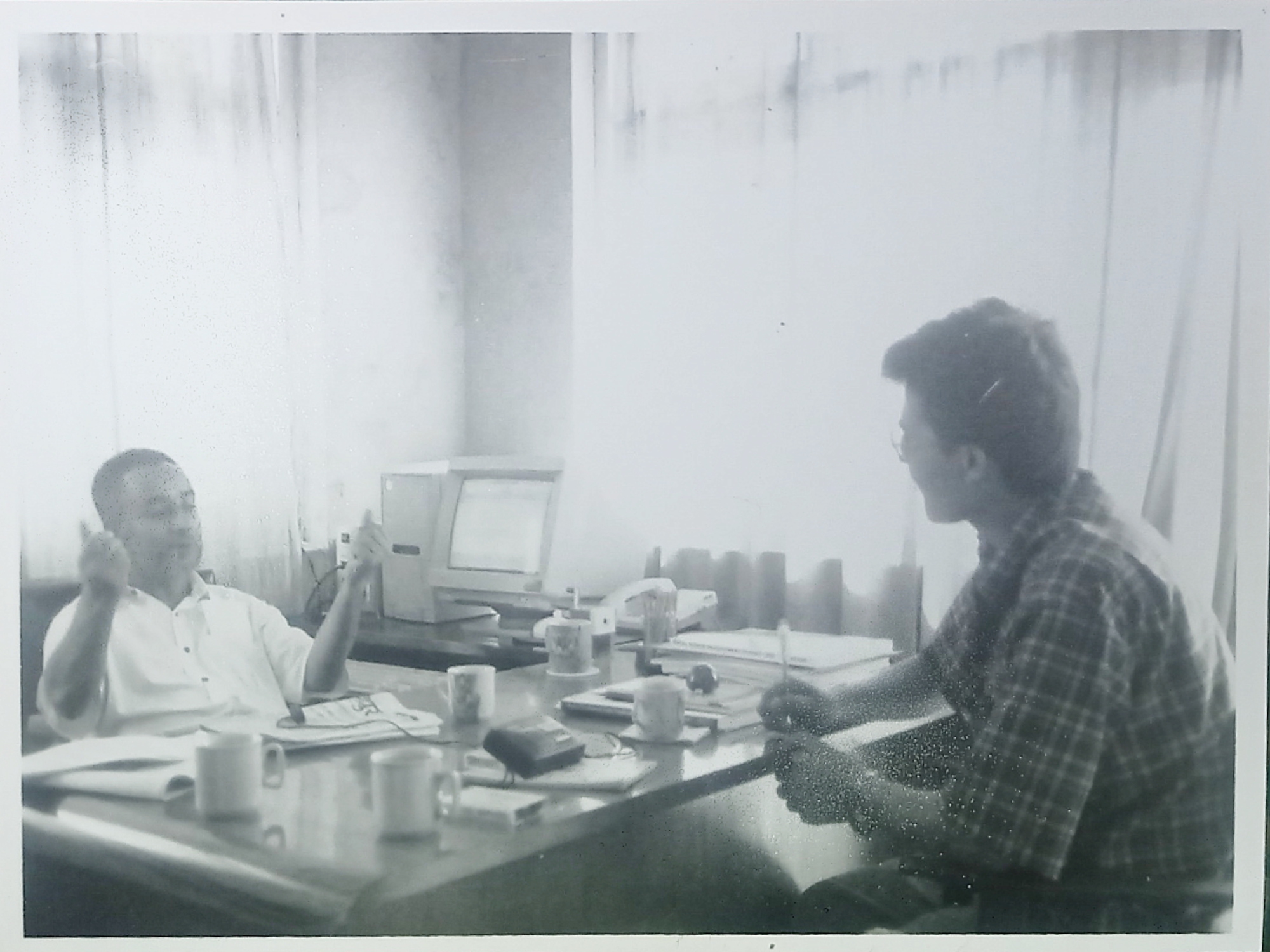
Towards writing and politics
From Kirtipur Secondary School to Tribhuvan University, watching ‘strikes’ and student movements in the 1980s, I developed an awareness of resistance. The wave of opposition to the Panchayat system that spread over Kirtipur, and in particular leftist thinking, influenced my own thoughts.
At 13 or 14, my social and political activism increased, and books and writing became an essential part of my life. If not for the activism of the 1980s, I wouldn’t be a writer. Various political and cultural movements turned me into a rebel. My mind became a platform of resistance. While involved with underground leftist politics and other movements, I learned to read political literature. With the aim of changing an unequal society, I started to read, understand, and write. Influenced by Nepal Bhasa literature and the Nepal Sambat movement, I began to write free verse. I tried to imitate other people’s writings and translate them into different thoughts, languages, and styles. But instead of poems and stories, I became more involved in organizing literary gatherings and editing the magazine Pyanki.
While working for Mulyankan, Garjan, and Inap weeklies, I became interested in features and essays. Writing in Nepal Bhasa and the Nepali language became a matter of interest, and livelihood, for me. I became influenced by what Marx had to say about choosing a profession that interests you. To make political life and writing my profession, in the 1990s, we started Mulyankan monthly.
While younger, on the one hand, my family wanted me to get into private enterprise while on the other, there was pressure to become a political wholetimer. As the operator of a publishing house, I conducted both public and community political work so there was no dichotomy between my interests and my profession.
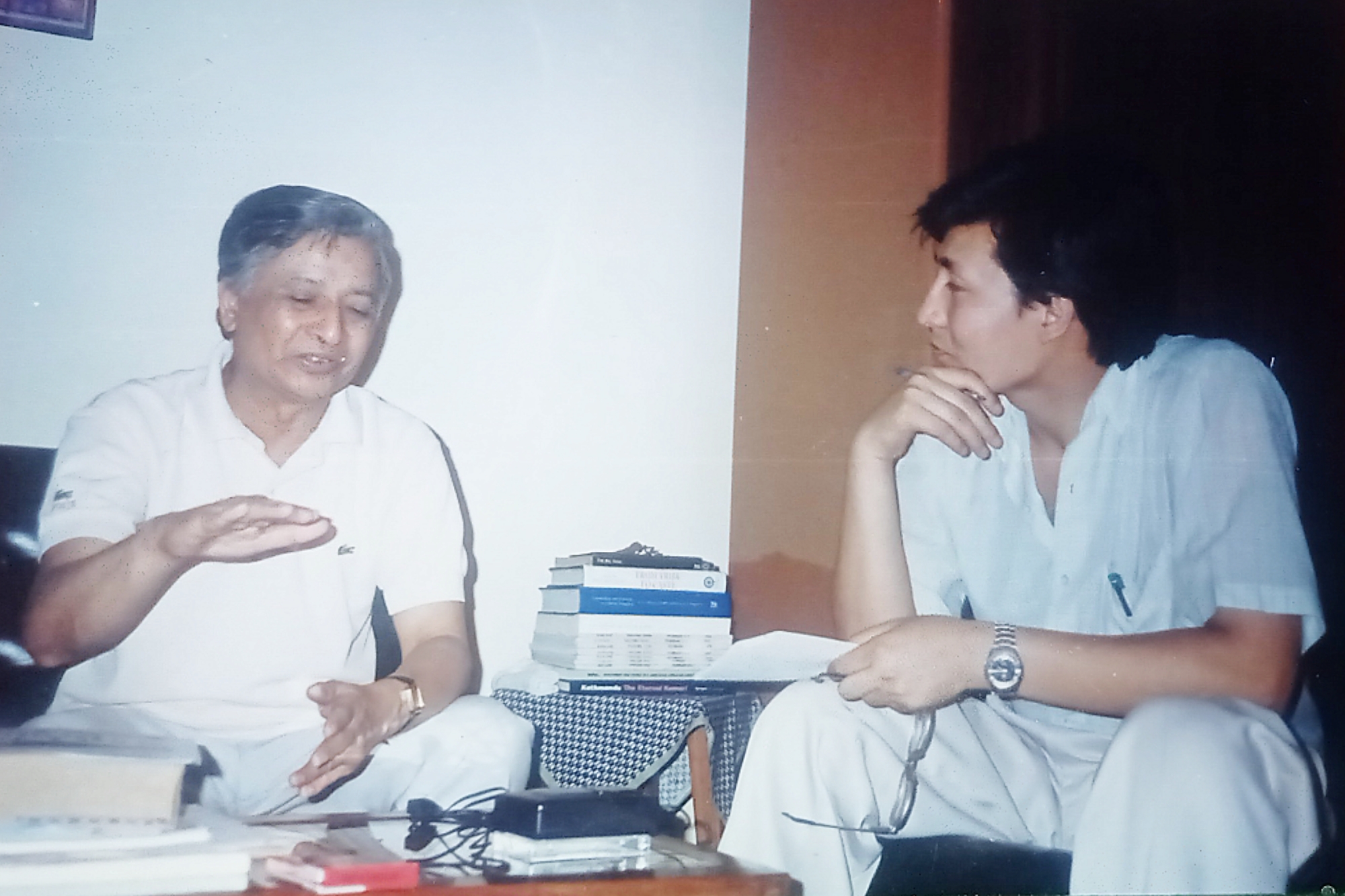
Writing method
For more than a decade, I edited Nawayuba and one issue of Pratibha, a children’s magazine. It was difficult to write and edit by keeping in mind the readers’ knowledge of language, information about the subject, and their societal perception. I learned to break down expressions, write in simple language, and eliminate unnecessary information, ideas, and jargon. For Mulyankan monthly, I started writing and editing political essays and also wrote and edited long essays for journals and books. Editing journals like Bikash, Rupantaran, and Madhesh Study, along with books about the caste system, helped my own understanding of society in my essays leap forward.
Before writing essays, I had already started writing editorials; my column-writing was simply an extension of that. I wrote on recent political events and various community subjects under discussion. Picking essay topics was always a challenge. Even after selecting a subject, it was not easy to research facts, study analyses by others, and build a critical argument. According to the experience of my carpenter-father and mason-grandfather, the hardest part was building the foundation. Picking a topic that can be written about is to build a solid foundation. If you have finished putting in the base, it’s not hard to put up the walls, doors, and windows.
In general, my essays start from other people’s poetry. I look for poetry even in books about politics and sociology. I find poetic commentary to be elegant as poetic expression was always my first love. My love is for the most powerful medium through which to express ideas.
Sometimes I quote other people’s ideas, as a way to fertilize my own writing. To inspire readers to think, I pose a relevant question at the very beginning. In this way, I try to gain their attention towards the issue I want to discuss. I have even completed entire essays with just questions.
After that, I look for facts with which to answer questions relevant to the topic, I quote others, and I build my own argument. I’m not satisfied with just commentary, and I’m not good enough to play with words, so I try to bring in facts, the arguments of others, and thus build my own argument. I borrow my mother’s method here – presenting what others say as a way to build my own arguments. By doing this, I can experience the world of knowledge beyond what I’ve seen, heard, read, and gone through.
I try to dig into the reasons behind the topic of discussion and take my readers towards the root of the problem. I enjoy looking for answers in history. No author can answer all the questions he raises, but that doesn’t mean he can’t ask the questions. Writing is about giving continuity to your ideas, and a good way to constantly question yourself. I would recommend new writers try this method.
One of my limitations is that I can’t always write in simple language or easily express myself in theoretical and factual language. Some readers complain that my writing is too complex. I write presuming that there are well-informed people on the field. I expect readers to work hard to understand the issues.
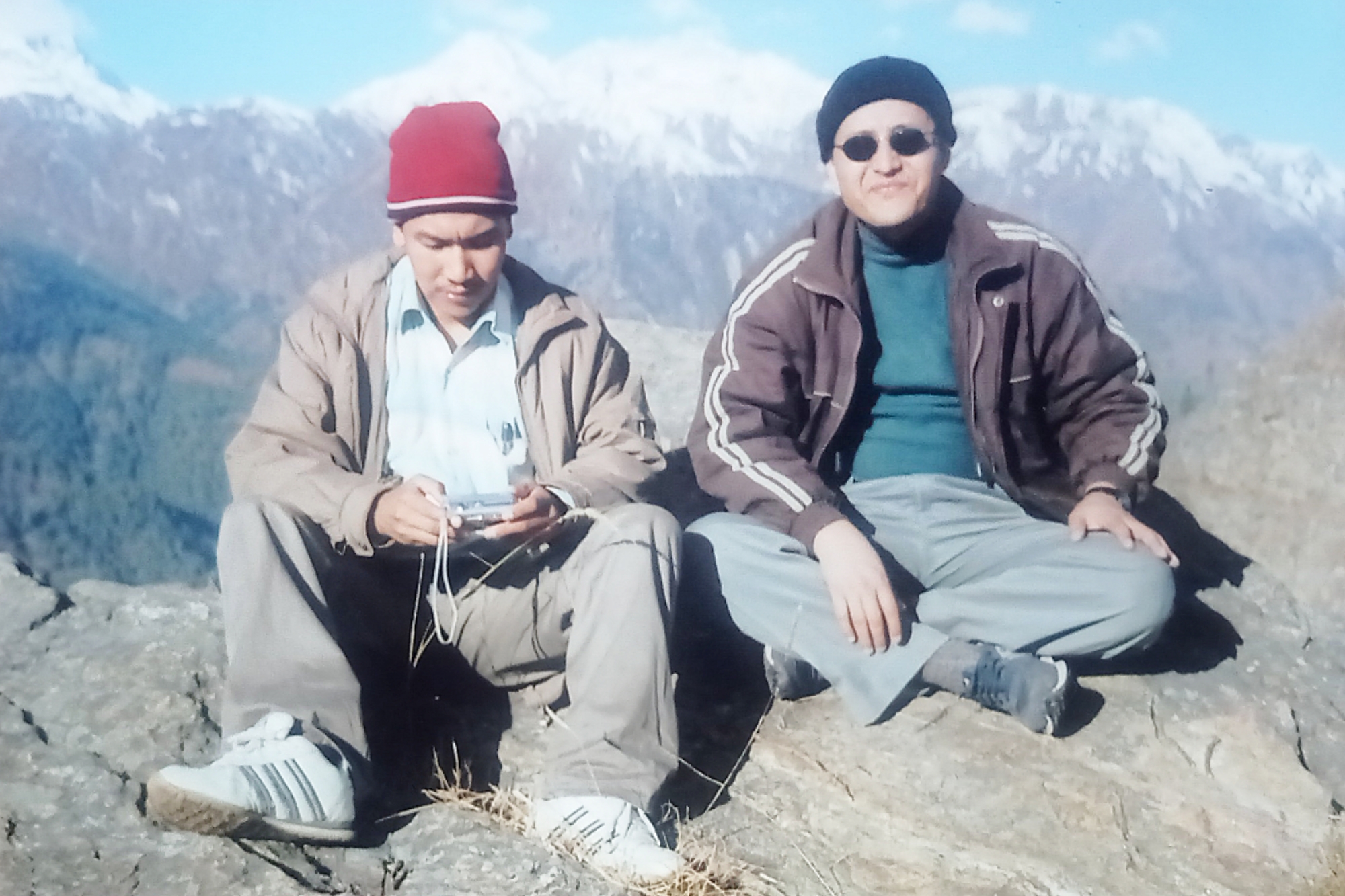
Unlearning
I started column-writing with two columns – ‘Janajiban’ and ‘Tayaju’ – for the weekly publication Inap. In ‘Janajiban,’ I wrote about the daily struggles of different kinds of workers. In ‘Tayaju,’ I wrote about historical struggles. But my writing only took a leap forward once I realized that Nepal’s conflicts can’t be understood through foreign concepts. With my interest in Nepali history and society, I now emphasize class, caste, gender, geography, language, and culture in the hopes that they will help us understand Nepal’s contradictions and help transform our state, society, family, and individuals.
Many know that I usually write about exclusion and discrimination. Because of writings like these, the special complexities of Nepali society have started entering public discourse. There is now writing about Nepal society from the perspective of Madhesi Dalits, from the viewpoints of Adivasi Janajati, especially Tamangs and Tharus, and from a gender perspective, especially Janajati and Madhesi women. To address exploitation and oppression, thousands of such writings are necessary.
Writing that is focused on society has its own complexity. There are not many historical and academic writings on issues of caste, gender, geography, language, and culture, as well as class. The writings that exist have been influenced by the nationalism of high caste Hindu hill males. So, there is a danger that they provide an inaccurate understanding of complex issues, which can be difficult to unlearn. But if we can’t weed out the misinformation and so-called ‘knowledge’ deposited into our hearts and minds, we cannot nurture new knowledge. When planting rice, my parents used to say that if you didn’t pull out the weeds, the shoots cannot sprout.
Now my studies and writings are in the process of unlearning and demystification. The process of destroying the false knowledge and information inserted into our hearts and minds by high-caste Hindu hill male nationalism is underway. I am writing from the information and knowledge that I have gained in order to demystify the weeds spread by that same nationalism. It is thus necessary to question every icon’s ideas and behaviors.
On one hand, only institutional knowledge is considered knowledge, and asking questions can invite verbal attacks, and a search for the questioner’s degree and status. On the other hand, it is difficult to find the alternative knowledge, the institutional base, and the intellectual and physical help that is required to unlearn and demystify. To update yourself, to expand your essays, and to look for answers to new questions, we need more inquiry and investigation. To face this kind of challenge, we need many more institutions to produce knowledge.
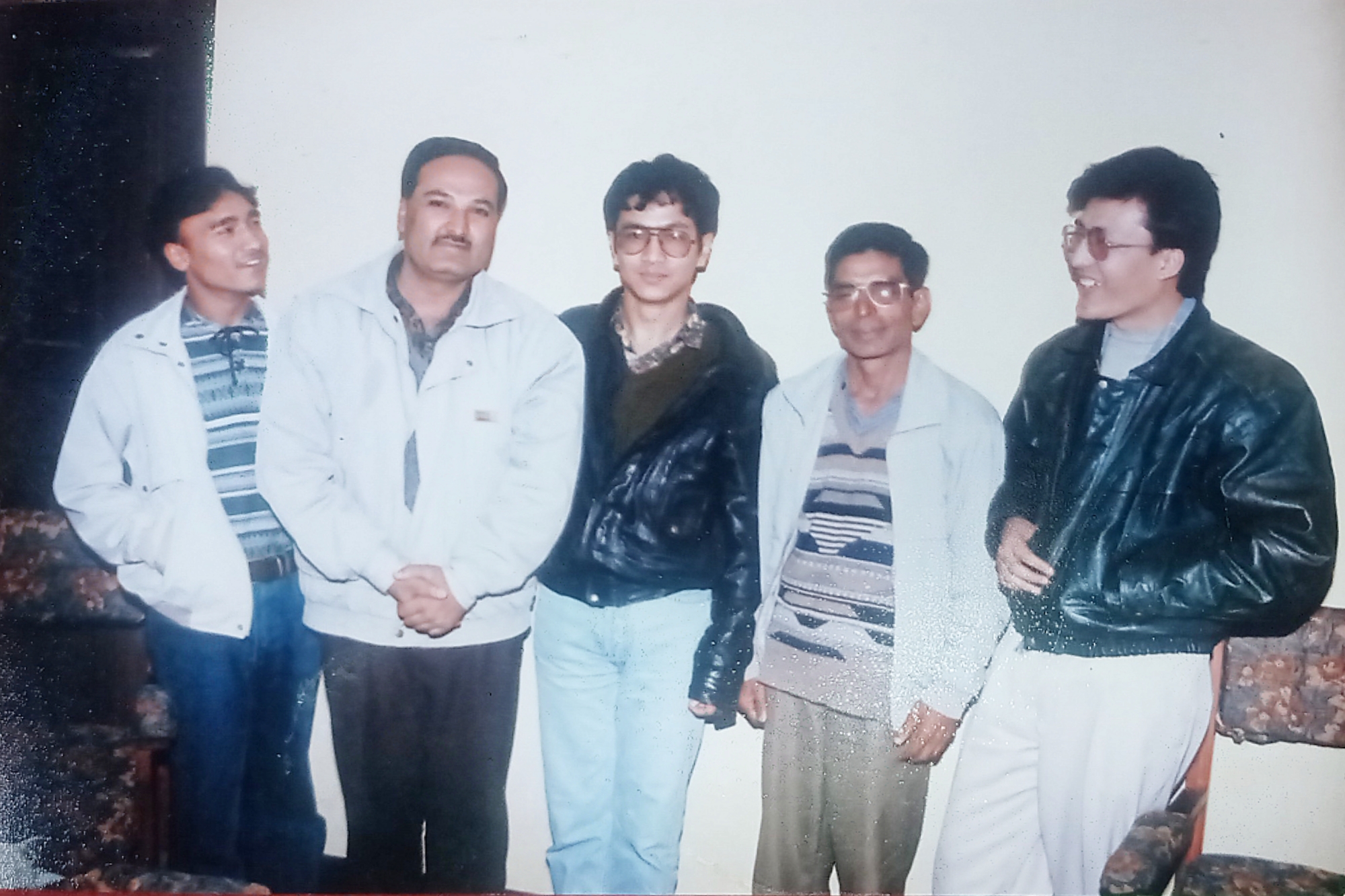
The duty to change oneself
In the life of a Jyapu like me, the cultivation of words has a seasonal cycle. In the 80s, along with writing and editing, I worked to help adult women look at their own lives through letters, words, and sentences. I got the opportunity to learn about women’s lives while working on a course for adult women through the organization Space. In the 90s, I provided writing training for rural teachers and educators while also publishing books. Providing writing and journalism training created the possibility for me to write.
In the next decade, I collaborated with Dalit youth through ‘Dalit Reader’. By editing and teaching op-ed writing, we were able to create a small space for Dalits in newspapers. We even tried to create more dialogue about Dalit issues and more studies about the caste system in academic writing and at Tribhuvan University. In this process, my approach has been to write about the caste system from a Dalit perspective. This is not just to teach, but to also learn in a dual process.
Some may feel I write about social exclusion and discrimination because I’m a Jyapu, Newar, Adivasi Janajati. But I try to write on Dalit, Janajati, and Madhesi issues because I pursue leftist politics.
In my writing, there is likely hidden a dream to change the world with words. But more so, I am trying to change myself. There’s an ongoing duty to take a stand against oppression wherever possible but what is becoming more necessary is to create structures and relations that are free of oppression, and to make oneself democratic, humane, and just.

Tom Robertson Tom Robertson, PhD, is an environmental historian who writes about Kathmandu and Nepali history. His Nepali-language video series on writing, 'Mitho Lekhai', is available on Youtube. His most recent article, 'No smoke without fire in Kathmandu’, appeared on March 5 in Nepali Times.


Writing journeys
14 min read
Raju Syangtan was once afraid of writing. Today, he is a celebrated poet and journalist. His story, on this week’s Writing Journey.
Books
Perspectives
6 min read
Tim Gurung reflects on his journey of writing a book that traces the history of the Gurkhas, why he wrote it and the lessons we can take away from it.
Writing journeys
6 min read
Since a lot of academic writing is unnecessarily difficult to follow, here are easy tips from accomplished academics on how to write simply, clearly, and succinctly.
Perspectives
6 min read
In this new edition of Tim Gurung’s series on his life and times, he details the changing business climate in China and his eventual turn towards the literary world.
Writing journeys
13 min read
This week, writer and activist Sarita Pariyar offers poignant insight into her own writing journey and the invisible women who inspired her to write.
Features
10 min read
The Abbot of Tengboche Monastery, Ngawang Tenzin Zangbu, who passed away on Oct 10, was renowned for his commitment to the sacred valley of Khumbu and the Sherpa people
Writing journeys
17 min read
This week on Writing Journeys, series editor Tom Robertson identifies 20 common mistakes Nepalis make in English and how to avoid them.
COVID19
Photo Essays
3 min read
Covid-19 forced Jaquir Mansuri to cancel his daughter’s wedding and delay his plans for retirement but the pandemic is not over yet and Mansuri has gone back to work.